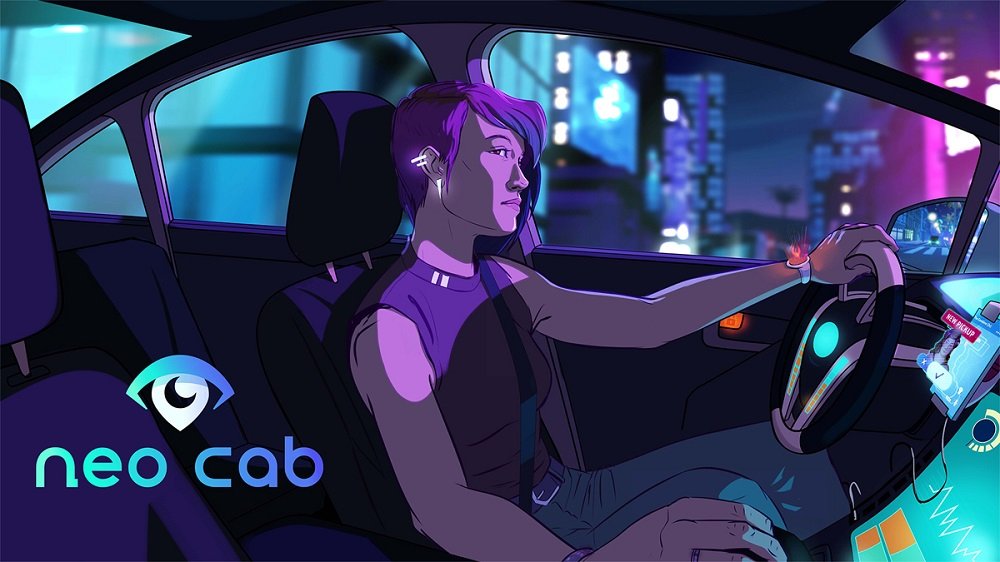Hop in, Mac, where ya headed?
Neo Cab is a game all about facing my greatest fear: being trapped and having to talk to someone in a confined area. Every time I step into a cab, I’m filled with dread as I pray that I got one of the rare untalkative drivers. Fortunately, Neo Cab is a bit of role reversal. In it, you play as an Uber-style cab driver who traps people in their car and forces them into small talk.
It feels good to strike such terror into other people.

Neo Cab (PC, iOS, Switch [Reviewed])
Developer: Chance Agency
Publisher: Fellow Traveller
Released: October 3, 2019
MSRP: $19.99 (Switch), $14.99 (PC), Part of Apple Arcade ($4.99 a month)
Rather than a driving simulator, Neo Cab leans closer into visual novel territory. Your character, Lina, does all the driving, and it’s your job to simply select who she picks up and what she says to them. The game’s challenge comes from trying to earn enough coin to keep your car on the road and a pillow under your head at night while also maintaining your driver star rating by providing good conversation.
Three times a night, you’re presented with a variety of potential fares to pick up. Not much information is given — just a profile image and a star rating — so you don’t know what you’ll get with every pickup. Maybe it’ll be a couple on their first date, maybe it’ll be someone who needs a lift back from the bar.
The narrative’s focus is balanced between Lina and Los Ojos, a futuristic city on the cusp of becoming fully automated. Privacy is nearly a thing of the past, with everyone under the watchful eye of the mega-corporation, Capra. Lina is one of the few remaining human drivers on the roads of Los Ojos, with most transportation being handled by automated cars. Her livelihood is being threatened by “Sophie’s Law,” a bill that would ban human drivers entirely in Los Ojos.
Meanwhile, Lina’s best friend, Savy, goes missing under mysterious circumstances, leaving Lina searching for clues. It’s a nice balance between the more personal tale of Lina’s troubles while also giving focus to the problems that are rotting Los Ojos from within.
Each fare comes with its own insight on the city’s situation. Some have bought wholesale into the changes that the latest technology brings them, greedily consuming the newest trends and happily broadcasting their lives, while others are hesitant to give away pieces of themselves in exchange for attention and convenience. Some ride the wave, while others are resisting it as best they can.
In its rather short runtime, Neo Cab covers a wide variety of topics ranging from familiar discussions on corporate surveillance to the possible effects of technology on intimacy. It’s pretty effective at extrapolating on current trends to comment on the direction of society. It manages to do so without too much finger-wagging. The player character makes their opinion on things rather apparent, but it’s generally up to you how harshly you judge the people getting in and out of your cab.
You’re usually given two or three options on how you want to respond to dialogue, and this can be somewhat confining. This is further restricted by the presence of your character’s Feelgrid, essentially a Fitbit for emotions. Your character’s current mental state is communicated through a tiled hexagon of colors that reflect what Lina is feeling, and sometimes when she’s in a specific state, you’ll be locked out of certain dialogue options.
While the Feelgrid ties well into the overall narrative, it’s hard not to feel somewhat limited by it. When dialogue choices are tied to your character’s emotional state, rather than your own, it can feel like you’re not in control — like you’re just Lina’s passenger, rather than the driver. It doesn’t come up enough that it becomes maddening, but it does detract from the overall experience.

On the other hand, the narrative trips over itself in a few spots. There’s an instance of fridge logic that is key to one of the game’s twists that soured things a bit. I also had multiple instances of my character referring to experiences with fares that I hadn’t yet picked up. Both problems aren’t dealbreakers, but they are fractures in an otherwise solid narrative, and considering narrative is the primary focus of the game while everything else is framework, it’s a shame to see such blemishes at all.
At one point, I was unable to progress because the only fare that would show up was one that required a five-star rating, something that was unachievable without other fares to pick up.
I’m still honestly uncertain if I hit a bug or if the game was telling me I suck so badly that I wasn’t allowed to proceed. Either way, it necessitated loading up an old save and replaying through completed nights. Whether intentional or not, it, unfortunately, ruined the immersiveness of the experience. No longer was I the victim of my own charitable attitude. Instead, I was now a master of time and space, able to erase the slightest mistake on a whim.

As with any visual novel, Neo Cab isn’t going to appeal to everyone, but those looking for a taste of conversation should be sated here. Through the lens of science fiction, it deftly explores many concepts that relate to real-world concerns, and that’s something to be commended.
Yet, while I had issues with Neo Cab, I will admit that it’s worth the fare. It perhaps didn’t set my world on fire, nor do I think it’s going to climb atop anyone’s list of favorite games this year, but it’s at least a nice ride while it lasts.
[This review is based on a retail build of the game purchased by the reviewer.]






Published: Oct 13, 2019 03:00 pm